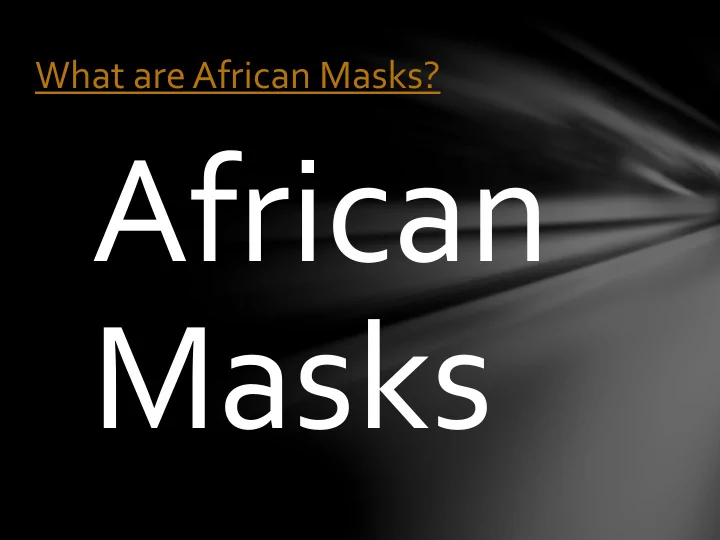

What are African Masks? African Masks
Why were masks made? Traditionally for spiritual reasons • Celebrations • Ceremonies • Initiations (when a young person becomes a member of the adult community) • To bring peace in troubled times • To connect with the spiritual world
Do most Africans believe in the spiritual power of mask ceremonies today? • No. Most Africans today are Christian, Muslim or Jewish. • Masks still represent a connection with their past, ancestry, background and culture. • The ceremonies are a treasured tradition passed down through generations. • Most masks today are made as artwork to sell to tourists or on the internet.
African Mask Ceremonies Today • Are often connected with special occasions, market days, or other events that may draw large crowds. • This allows the masks to be displayed for many to see, and some of the traditional dances to be performed.
Watch his shoulders, too! An impossible ceremonial dance? • Many ceremonies today are attended today so that people may connect with their traditional past. • The ability to dance a ceremonial dance well is highly appreciated, in fact, if you watch closely, you will notice that people are throwing money to the dancer as well as voicing their appreciation of the dance. • Can you think of a similar situation in your culture?
African Elephant Masks • Used by the Kuosi society among the Bamileke • Focuses on the animal spirit of the elephant • Were associated with the king, because the elephant is also a king of the forest • The more ornate, the wealthier and more powerful the king • Some are worn with headdresses, others are not
African Elephant Masks • Are rare due to the use of fabric • Are worn over costumes that cover the body • Beads are stitched into geometric patterns • Mask is symmetrical • Mask has large eyeholes and abstract ears • The front panel represents the trunk. • Nose and mouth are also present
African Elephant Masks A great link for African elephant masks!
An African Elephant Mask on sale today • Older, very traditional masks were treasured by Europeans and brought back home from travels to Africa. Some paid for, others were looted. • Because of the natural materials that many masks were made of, many masks that are in museums are not necessarily very old, even though they may look very old. • Newly made African masks can easily be found on the internet for sale
• As you watch, notice the large variety of masks, but pay close attention to the Elephant masks! • The dancing is exhausting, remember they have poor visibility behind the masks, are covered with itchy materials, and are balancing the masks. • Some of the masks you see in this clip weigh as much as 75 pounds! • Most of the dances, therefore, are men between the ages of 18 and 30. Ceremonial African Masks
Resources http://www.daytonartinstitute.org/art/collection- highlights/african/bamileke-people http://www.africadirect.com/masks/bamileke-and-cameroon- grassfields/bamileke-beaded-elephant-mask-cameroon-africa-86628.html http://www.lotusmasks.com/category/history-african-masks.html
Recommend
More recommend